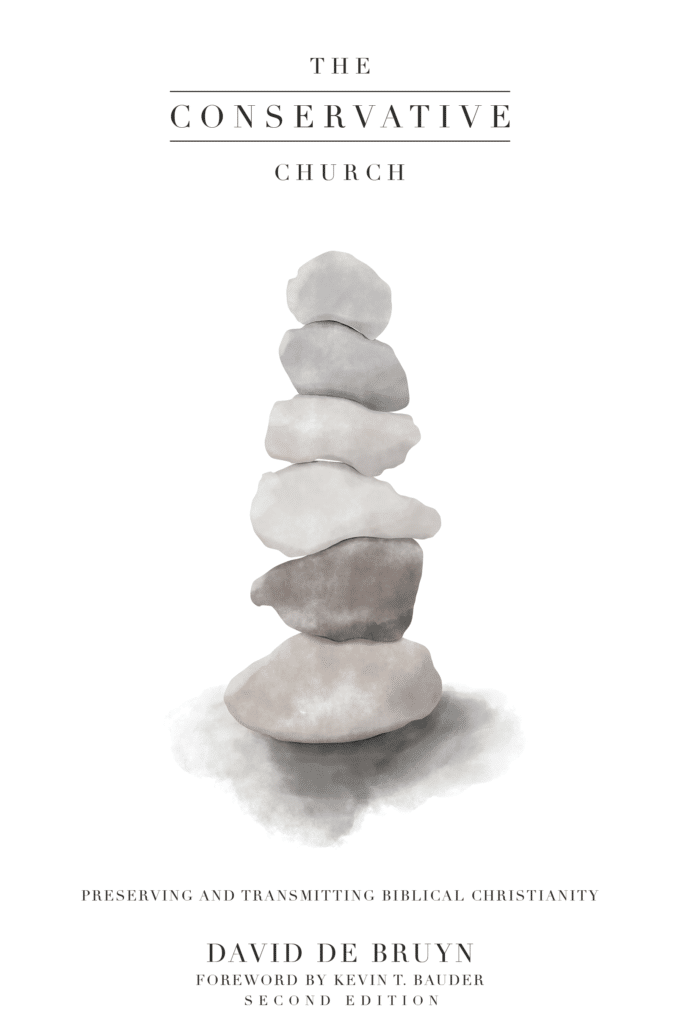
How do we “conserve” Christianity and conserve it rightly? That is what David de Bruyn addresses in The Conservative Church: Preserving and Transmitting Biblical Christianity.
The book is divided into three sections: Orthodoxy, Orthopraxy, & Orthopathy. Each is defined and defended in importance and implementation. Orthodoxy is explained this way: “Christianity must begin with a clear understanding, propagation and defense of the evangelium: the gospel. Apart from the gospel, we have no Christianity. The gospel forms the doctrinal boundary of the faith, and if the boundary is eroded in any way, the whole system of faith is under threat” (4). Orthopraxy is defined as “the correct application of Christian doctrine to home life, church life, civil life, economic life—indeed, all of life” (5). Orthopathy is explained: “Christianity is more than a set of doctrines and a set of practices. Christianity is also, and primarily, a life of love. It is a life of loving God and man. The Christian life is one of learning to love what God loves and hate what God hates. A maturing Christian is learning to love God, humanity, and creation as God Himself does. . . . Orthopathy requires sound judgment: rightly discerning the meaning of God’s Word and works humanity, and the created order, and thereby loving them ordinately” (5).
De Bruyn argues that these concepts are to be taught and defended in the local church. There is a need for resurgence and reformation because in some churches, or even in individual Christians’ lives, these concepts are not accepted, implemented, taught, or defended. Christendom is not as “fully-orbed” as it could be. Because of this, future generations are at risk.
This book is not just a critique of how other churches function or how other pastors lead. De Bruyn’s words contain concern and a desire to see God’s Church flourish. When critiques appear, they are intended to exhort and correct (2 Tim 4). The following presents a good example of de Bruyn’s intentions with this book:
I am convinced that the kind of reform we need may take more than one generation to achieve. Even so, we must build with what we have, encouraging what is needed, removing what is unhealthy, and keeping some things alive for future Christians who may be better prepared to love, honor and use them. (6)
In the section on Orthodoxy, de Bruyn’s definition and explanation were the foundation upon which the other chapters stand on. The gospel is under threat and there are four ways it is attacked:
- When its intention is misrepresented or misunderstood.
- When its meaning is warped.
- When its importance is undermined.
- When its proclamation is neglected.
This section must be understood in order to understand the rest of the book. De Bruyn explains what the gospel is and what is it not. He explains how not knowing the true gospel creates falsehoods masking as “Christianity.” He also explains how these falsehoods happen: “The meaning of the gospel is only in dispute when professing Christians deviate from the sourcebook that defines the gospel: Scripture” (12). The responses to Orthodoxy are Orthopraxy and Orthopathy, and these have true correct forms of expression as well.
De Bruyn explains three areas Orthopraxy affects: worship, piety, and ecclesiology. I found myself wanting to highlight large portions of this section due to the clarity and ease of understanding it had while still convicting the heart of the reader. A great summary on worship stated,
God does not accept worship merely because it is offered in his direction. God does not accept worship merely because one of his dedicated servants does the offering. God does not accept worship merely because it serves a pragmatic purpose. Sincerity, Pragmatism, or dedication do not transform false worship into acceptable worship. There is worship which pleases God and worship that does not. (50)
When addressing Ecclesiology, de Bruyn briefly touches on church polity. I would like to have seen his take on it fleshed out, but for the sake of the purpose of the book, I understand not going that route. Taking this route flows in line with his takes on biblical unity, which I appreciated. Later chapters gave more practicality and advice to congregationalists which was also appreciated.
Orthopathy was the concept I knew the least about and one de Bruyn argues is the most neglected and most misunderstood. “Affective truth” (that we can have truthful or untruthful responses to God’s universe) was something I had never considered or deeply explored. As de Bruyn exlpains, “Ordinate affections lead to ordinate judgments, tastes, and sensibilities“ (92).
De Bruyn makes convincingly argues that all three “orthos” are important and necessary. A three-legged stool can’t stand without all three legs. Remove any of the three and the others suffer and eventually crumble. He humbly asserts that his work is neither exhaustive nor completely original but comes as a result of many before him expounding on these topics and influencing his life and thought. I believe he is selling himself a little short. I find his work not only to be a great companion book to other teachings but an extremely helpful and understandable book on its own.
This book is beneficial for the people in the pews and the men in leadership. This book would be a great resource to add to membership classes or elder candidacy programs of the local church. This book is profitable for the congregant. They can use the concepts taught to examine and test their local church and give accountability to its leaders. It is practical and convicting for the leadership. It gives tangible ideas on how to implement or change certain aspects of the church and its teachings to be as biblical as they can be this side of eternity.
The Conservative Church is available now with G3 Press. I would like to give a special thanks to David De Bruyn, Scott Aniol, and G3 Press for the opportunity to read this book in advance and provide a review.




